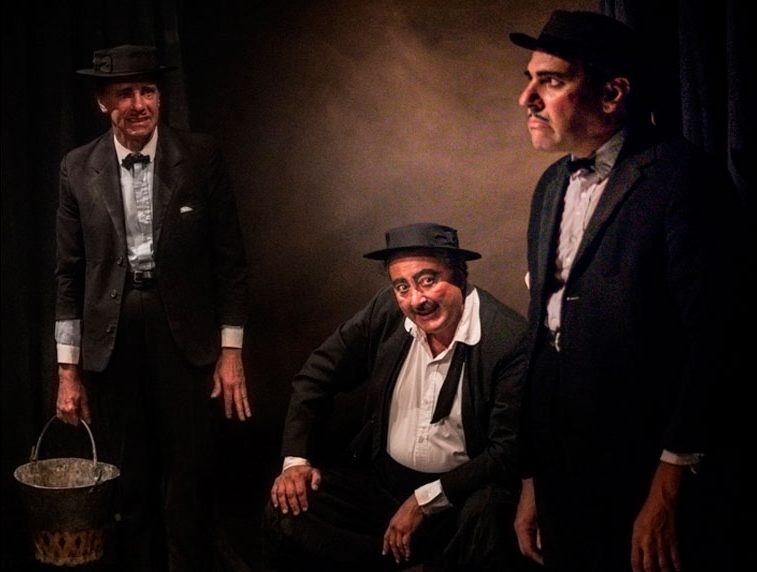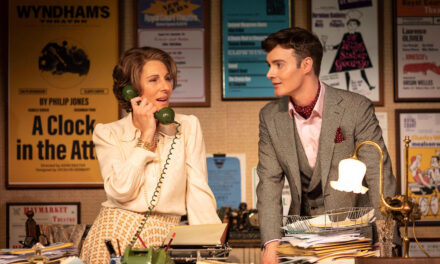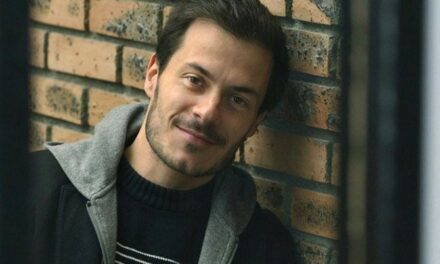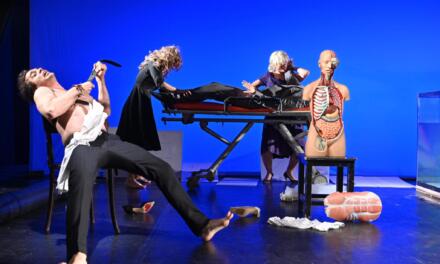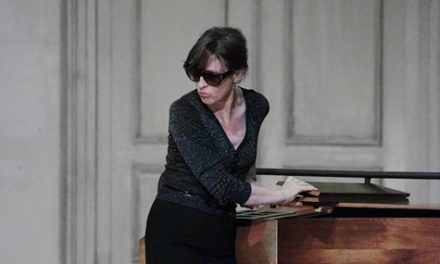Born in San Martín, Buenos Aires province, Argentina in 1946.
Plays: Sacco y Vanzetti (1992), El pato salvaje (1997), El zoo de cristal (2002), El niño argentina (2006), Ala de criados (2009), Salomé de chacra (2001), Terrenal (2014), among others.
Awards: Konex Award recognising him as one of the five greatest figures in Argentine theatre in recent years in 1994, four Ace awards in 2007 and 2010, as well as four Theatre of the World Awards, among others.
Influences: Augusto Boal, Roberto Cossa, Ricardo Monti, Griselda Gambaro and Armando Discépolo.
If you ever see a man with white hair and a notebook in his hand walking aimlessly around Almagro, chances are it’s Mauricio Kartún concocting a new play for everyone’s delight. Ever since his first play premièred back in 1973, Kartún has never ceased writing. An unstoppable creator, he has received awards as one of the city’s most important artists; it’s no wonder every playwright and director in Buenos Aires mention him as a fundamental influence in their work. Because Kartún is, first and foremost, respectful of the creative process and everything writing entails. In a meeting with the Herald that felt more like a master class on writing at times, he talked about his most recent play, Terrenal, and about La suerte de la fea, on at Timbre 4 now.
How did you come up with La suerte de la fea?
I wrote it over 10 years ago for an event in Madrid to which I had been invited to present a monologue. I had another play on at the time and I was teaching; I was so exhausted, but at the same time, I wanted to write it. So I took part in the universe of La madonita, another play with dark and lonely men lurking around in coffee shops, and I took that imagery for La suerte de la fea. For those of us who write, images are more important than ideas. Images are a key material to build a play just as bricks are to build a house. So I borrowed some of those images and a hypothesis for La suerte de la fea appeared. After Madrid, I didn’t put it on here. I always felt it was too short. But then Pola Dullitzky, who had been my student, called me and said: “You might say otherwise but there is no actress who will understand this play as deeply as I do.” And so she found a director, Paula Ransenberg, and they showed me what they had and I loved it. In the end, because of it being a monologue, it was better to be short because it’s an easier plate to digest.
What about Terrenal?
Terrenal was the result of a weirder process. The idea came to me from two very different impulses. Twenty-five years ago, I took my sons fishing to a little lake in Benavidez. When we got there, I saw two guys selling different kinds of fish bait. They looked alike but they were fifty metres away from each other. So, probably because my sons were fighting, I thought: “These two are brothers and they’re angry with each other.” Then came another image: they have inherited some land here in Benavidez left over by their father, and because of that they don’t even speak to each other, they have split the land in half. From that, I imagined a stage split in half but that was all. I wrote that down and I never touched it again; I always thought there was something missing. Twenty years later, I was reading a book on Hebrew mythology for Salomé de chacra, and I stumbled upon the ideological development of the myth of Cain and Abel. Far from being about brothers who fight, it is actually about two tribal drives: nomads and sedentaries. It is a standoff between two cultures because sedentaries are accumulators and must be warriors to defend what’s theirs, while nomads don’t need to have so many things and have time as their only capital. I thought it was lovely and I was surprised that it had been right there this whole time. I wrote the play quickly after that.
It’s incredible how important patience is in the creative process.
It is. Writing is not just about will or volition. There’s an internal evolution without which what you write is liquid, and can’t be grabbed. The only thing that can solidify a piece of writing is the presence of images, and that’s something that always takes time to mature. The problem is that there comes a certain point in your life when you want to be successful, and for that, you have to do things quickly and effectively. In writing, you have to be patient and understand that while a piece is maturing, it’s working.
Why did you write Terrenal in the style of clown theatre?
It just happened. When you see a finished play, you can come up with a whole system of causalities, but when you’re writing, the process is actually defined by coincidences. I chose to do it like that because I felt that the only way in which I could tell this story and have it be plausible, was by doing it far from any sort of realism, and so it landed on clown. Then, with the staging, the concept of clown became even stronger. The theme of the varieté was already present in how Tatita describes the whole world as being one but it wasn’t until we started rehearsing that I confirmed that the tone of the play was that, as well.
The dialogue is also very particular, with subjects and verbs missing at times.
That has to do with the inner music the words make. In everyday speech, we Argentines use a lot of ellipses and I’m attracted by that. We use metonymies: we mention a part of something to refer to the whole. When it comes to writing, however, you feel obliged to be more academic. I’ve been trying to stick to the beauty in the colloquial forms for years. Also, I needed characters that would talk in a singular way that went beyond the conventional manners of speech so that the play would have something biblical. When you’re writing a play, the biggest secret is to find its voice. Once you find it, the play speaks to you. Last but not least, I chose to work with shortened dialogues because there’s a limit to how patient spectators are with words, so when you can find a system that will allow you to do without them, the play becomes more compact. I really like working with few words, and to have them be strange.
How has your work evolved over time?
Evolution is a term with a mistaken implication because it refers to growth and I’m not sure that writing is growth. I think it’s a metamorphosis. You change with your circumstances and who you’re surrounded by also changes. I think my work has changed as each new material needed it to. As time goes by, your body starts aching, so your body starts compensating for that. If your knees hurt, you find an elegant, albeit a slightly ridiculous way, to go up the stairs, like I did. It’s the same with writing. You work on your pains and your satisfactions, and so you start thinking where you can write from without it hurting too much, or what you have the energy to address. I can’t write like I used to when I was thirty. There is a certain passion and fervour I had for politics that I don’t have anymore.
Are there certain recurrent themes in your plays?
Yes, and I’m embarrassed by that. Thick humour, for example; it’s something I’ve liked ever since I was a kid. I figured out how to use it as a poetic ingredient in my writing, and sometimes I feel like I’d like to steer clear of that, and write differently because it would add a new colour to my palette. Theatre within theatre is present in all my recent plays. In Terrenal it’s very clear but it’s also there in Salomé de chacra, Ala de criados and El niño argentino.
How would you describe the Argentine theatre scene today?
There’s an extraordinary activity, as well as an amazing amount of drama students: three times as many as any other world capital. I feel like I’ve been rewarded as a playwright somehow with an immensely favourable context in these past few years. I travelled a lot with Terrenal, and I found it really hard to find an audience as enthusiastic as that of Buenos Aires. I’m also amazed at how many creators who are under 30 there are, particularly young women. We have to remember that women started writing and making theatre only 150 years ago, so it’s amazing that so many young women have worked so audaciously to create their own poetry. It makes me feel like we have at least 20 more years of theatre guaranteed.
When and where
La suerte de la fea is on Sundays at 5pm and 7pm at Timbre 4 (México 3554).
Tickets at $250 online or at the venue.
Terrenal is on Thursdays and Sundays at 8pm and Fridays and Saturdays at 9pm at Teatro del Pueblo (Av. Roque Sáenz Peña 943).
Tickets at $280 online or at the venue.
This interview was originally posted on buenosairesherald.com. Reposted with permission. To read the original post, click here.
This post was written by the author in their personal capacity.The opinions expressed in this article are the author’s own and do not reflect the view of The Theatre Times, their staff or collaborators.
This post was written by Veronica Stewart.
The views expressed here belong to the author and do not necessarily reflect our views and opinions.

